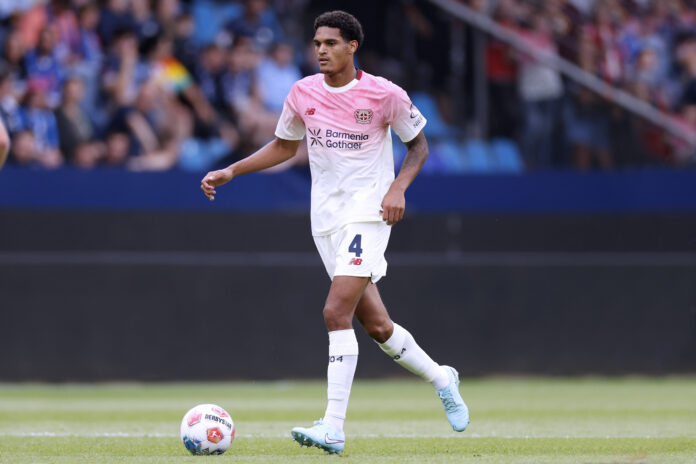Why Selling Quansah Could Be the Right Move for Liverpool
Selling a homegrown player is always bittersweet. Jarell Quansah’s £30m move to Bayer Leverkusen (plus £5m in add-ons) was no exception to this rule. There was a tinge of sadness seeing him go – a 22-year-old centre-back raised in Liverpool’s system, already capped at youth level for England, and showing the potential to become a regular for the senior side. But football decisions often require cold logic, and in this case, the choice could be a brilliant piece of business.
The simple truth is that Quansah needed games, at a club befitting its current progression. At Liverpool, those opportunities were going to be limited under Arne Slot. Virgil van Dijk still commands the back line, Ibrahima Konaté remains a key part of the rotation, and Marc Guehi is likely to arrive in the next two windows. Add in Joe Gomez’s versatility and the long-term project of Giovanni Leoni, and Quansah was in danger of being squeezed out at a pivotal stage of his career. Obviously, Leoni came after the sale, though at four years younger than Jarell, he can accept more of a project role. Guehi, however, is an established leader who can cover Virgil and also facilitate everyone in the rearguard.
https://twitter.com/theanfieldtalk/status/1963568050201862290?s=46&t=rxgukmqdoXc4muVFLSx2EQ
By contrast, Bayer Leverkusen offered him the platform to play consistently in one of Europe’s most competitive leagues. Already in the Bundesliga he is showcasing his aerial dominance – no surprise given his 6ft 3in frame – and the regularity of his starts will accelerate his growth. A player of his profile could easily stagnate if left on the fringes at Anfield; now he’s in the perfect environment to develop and one day propel himself back into an elite setting.
Development Abroad and the Buy-Back Clause
What strengthens the logic of this move further is Liverpool’s foresight in negotiating a buy-back clause. For €60m, active from 2027, the club retains the option to bring Quansah back should he evolve into the defender many expect him to become. By then, the timing could be perfect and represent a genius safeguarding by the Reds executives.
Virgil van Dijk will be 36 in 2027, Joe Gomez will likely have moved on, and Konaté’s long-term future is still unresolved with his contract running out in 2026. Liverpool cannot afford to wait and hope those issues fix themselves. By inserting the clause, Michael Edwards has protected the chance to refresh the back line with a defender who knows the club, has matured in a top European league, and will still only be 25.
The names linked with replacing Erik ten Hag at Bayer Leverkusen — Oliver Glasner, Edin Terzić, Roger Schmidt, Marco Rose, Ange Postecoglou, and even José Mourinho — highlight just how quickly the Bundesliga can shape a player’s trajectory. A top-level coach will only accelerate Quansah’s development, whilst a most guaranteeing him playing time. If he establishes himself as a European-calibre centre-back, Liverpool will be in a position to swoop back at the perfect moment and pay a mere £20m more than what they sold him for.
It’s worth remembering that this strategy mirrors how the club has often operated: sell at the right time, protect the future with smart clauses, and trust the player to improve elsewhere. It’s not emotional, but it’s effective. It may not work out that way and if it does not; the sale price of this summer was great business and has already been reinvested.
https://twitter.com/lfctransferroom/status/1963571740484772133?s=46&t=rxgukmqdoXc4muVFLSx2EQ
The Bigger Defensive Picture
Liverpool’s defensive planning is clearly evolving with a long view. Guehi is expected to join in the new year, and Leoni is being carefully integrated as a project for the future. That leaves Van Dijk as the short-term anchor, Konaté as the question mark, and Gomez as the versatile squad option. Within that mix, Quansah’s pathway was blocked and he may have become the next Nat Phillips. His sale not only funds immediate business but also clears the stage for the next cycle of defenders.
If Quansah fulfils his promise at Leverkusen and returns in 2027, he could walk into a back line that needs renewal, with experience abroad and a stronger platform than he could have built as Liverpool’s fourth-choice. It’s a rare example where selling a young talent doesn’t have to mean losing him forever, with his homecoming perhaps allowing a steady reintegration.
So yes, it’s sad to see him go now. Quansah had the potential to become a pillar at Anfield, and part of me wishes he could have been given more time here, yet the logic is clear. When I take the emotion out of it, the move feels smart and I cannot question the manoeuvres of the recruitment team this summer. Liverpool has ensured his development isn’t stunted, they’ve banked a healthy fee, and they’ve kept the door open for a return. If all goes well, selling Quansah may prove to be not an end, but the beginning of his true Liverpool story.
https://twitter.com/benbocsak/status/1962088690773098763?s=46&t=rxgukmqdoXc4muVFLSx2EQ



